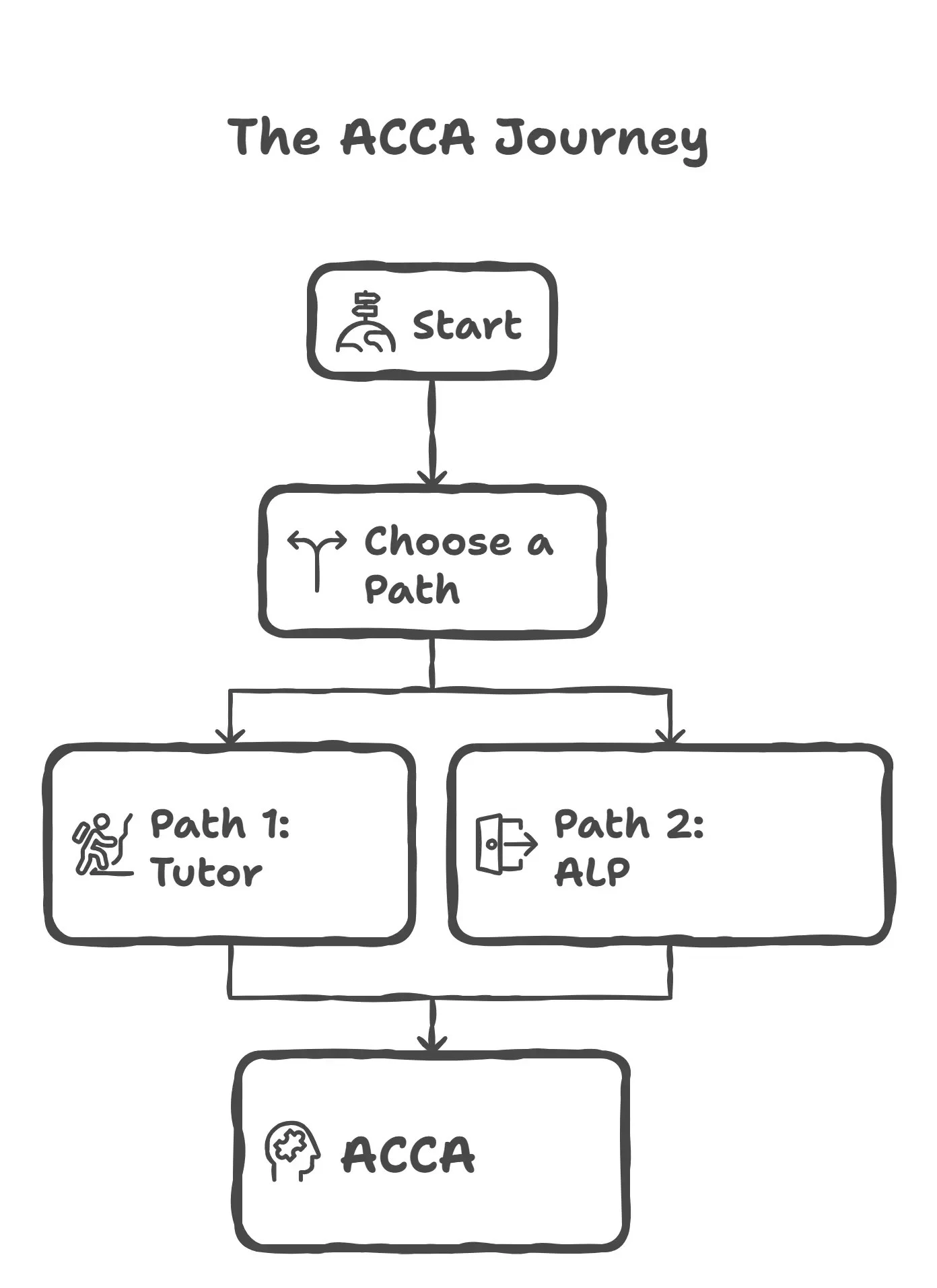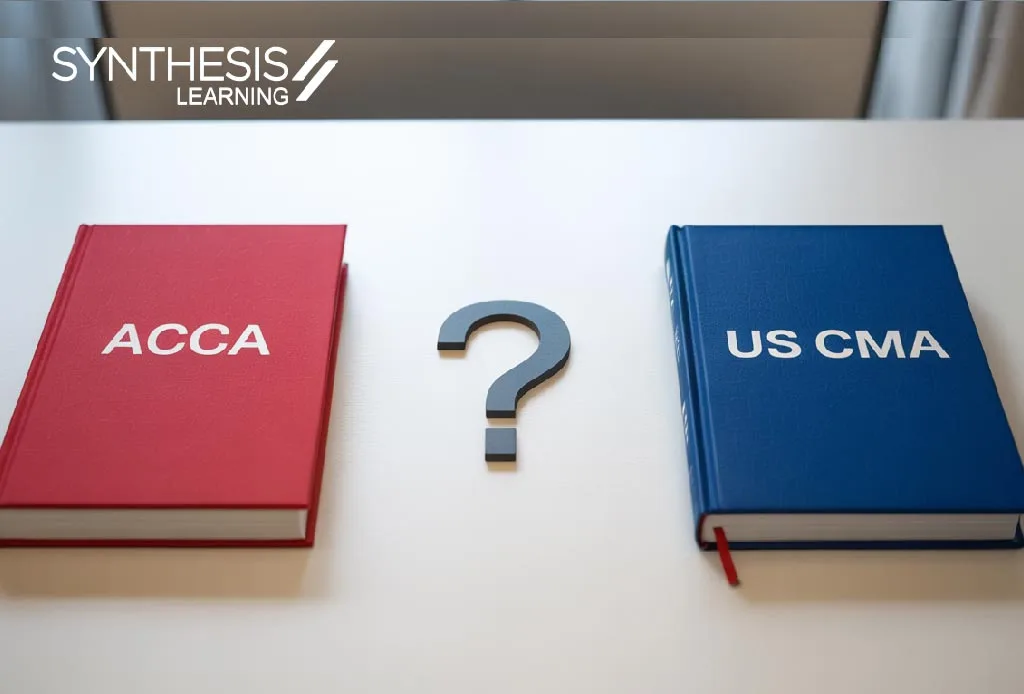Learning Paths Decoded: ACCA Tutor vs ALP, Finding What Fits You
The Crossroads Every ACCA Student Faces
You’ve watched ACCA lectures on YouTube, joined Telegram groups, maybe even studied with a tutor recommended by a friend.
It all feels exciting at first, flexible, affordable, and accessible.
But as the journey progresses, the same question returns for nearly every aspirant:
Should I continue learning through independent tutors, or enrol with an Approved Learning Partner (ALP)?
Both can lead to success, they just take different routes to get there.
Let’s decode what each option truly means, how they differ, and how you can decide which one aligns with your learning style and goals.
The Tutor Route: Personalised, Flexible, and Self-Driven
Independent tutors — whether they teach online, in personal batches, or through one-on-one sessions — are often the first stop for many ACCA students.
And for good reason. They offer:
- Freedom: You can choose your teacher, timing, and study pace.
- Affordability: Lower fees, especially when studying only one or two papers.
- Personal Touch: Small batches often mean personalised guidance.
However, as your ACCA journey unfolds, managing multiple tutors, paper planning, and exam registration can start to feel fragmented.
Here are a few challenges that often come up with independent learning:
- No single roadmap — different tutors may follow different teaching orders.
- Variation in teaching quality or updates to the ACCA syllabus.
- Limited help with registration, exemptions, or exam formality guidance.
- Few opportunities to connect with peer learners for motivation and benchmarking.
- No central accountability — self-discipline drives everything.
That said, if you enjoy flexibility and are confident about managing your own timelines, this approach can work brilliantly.
The key is understanding your own motivation level — because independence is both its biggest strength and its toughest test.
Inside the ALP Ecosystem: Structure, Support, and Global Alignment
What Is an ALP?
An Approved Learning Partner (ALP) is an institute recognised by ACCA for meeting international standards in teaching, guidance, and student outcomes.
These partners undergo periodic reviews by ACCA to ensure that the curriculum, faculty quality, and student support stay aligned with global benchmarks.
What ALPs Typically Offer
ALPs are designed to simplify and strengthen the overall student experience — academically and administratively.
Their support often includes:
- End-to-End Guidance: Registration, exemptions, and paper sequencing support.
- Structured Curriculum: Classes aligned with ACCA’s official syllabus and exam calendar.
- Mock Tests & Feedback: Regular assessments with insights for improvement.
- Mentorship & Progress Tracking: Ongoing doubt-solving and motivation sessions.
- Peer Network: Interactive learning through study groups and alumni communities.
- Career Readiness: Many ALPs also extend training for placement preparation, soft skills, and interview readiness.
Types of Approved Learning Partners (ALPs)
Globally, ACCA recognises learning partners under three categories — Silver, Gold, and Platinum.
Each level reflects the partner’s track record in teaching quality, student support, and exam outcomes.
Platinum ALPs represent the highest global benchmark — institutes that have consistently demonstrated exceptional student success and compliance with ACCA’s rigorous quality standards.
Institutes like Synthesis Learning, for instance, hold Platinum Approved status, a distinction awarded by ACCA for delivering structured learning, exceptional mentoring, and strong student performance — aligning every stage of preparation with global best practices.
Points to Consider Before Choosing an ALP
While ALPs bring consistency, they may not suit everyone equally.
Here are a few practical considerations before deciding:
- Higher fees compared to individual tutors.
- Fixed class schedules may limit flexibility for working students.
- The learning setup can feel more formal and structured.
- Experience quality may vary depending on the ALP’s faculty and size.
When choosing an ALP, look for one that offers flexibility to balance studies with work or college, yet maintains strong teaching standards.
Avoid partners that compromise quality for lower fees — your qualification deserves guidance that’s both adaptive and reliable.
Two Paths, One Goal — Different Journeys
Imagine the ACCA journey as two roads leading to the same destination.
Tutor Path:
You design your own route — finding tutors, managing registration, and creating your study plan.
It’s flexible, but it relies heavily on personal discipline and research.
ALP Path:
You follow a guided roadmap — structured classes, scheduled mocks, and centralised mentorship.
It’s organised and consistent, but less customizable in pace.
Neither path is “better.” The real question is — which one fits your personality and rhythm of learning?
The Hidden Costs and Practical Fees
Managing ACCA registration, exemptions, and exam scheduling independently might sound simple — until you start tracking all the moving parts.
Most Approved Learning Partners (ALPs) handle these tasks centrally, bundling fees and formalities into one smooth process.
This doesn’t just save time — it saves money too.
On average, students save around ₹60,000 through coordinated registration, exemption management, and exam support offered by ALPs.
It’s not about paying less; it’s about paying smarter — and learning without the admin load that often slows students down.
These savings vary, but the key takeaway is that ALPs simplify what often becomes a logistical challenge for independent learners.
At the same time, students who prefer self-management may value handling these processes themselves — gaining autonomy and familiarity with ACCA systems.
Your ACCA Journey, Your Direction
Whether you choose a tutor, an ALP, or a mix of both, your success depends on how consistent and informed your journey is.
Each path has its own rhythm:
- Tutors offer flexibility and personal attention.
- ALPs provide structure, mentorship, and accountability.
Before you decide, ask yourself:
- What kind of learning keeps me motivated and consistent?
- Do I prefer self-paced exploration or guided structure?
- How much flexibility do I need to balance studies with college or work?
The ACCA qualification is not just a series of exams — it’s a commitment to professional growth.
Choose the ecosystem that complements your lifestyle and learning habits, and make sure your decision adds clarity, not complexity, to your path.
Because ultimately, it’s not about who you learn from — it’s about how you learn, and how far that learning takes you.






